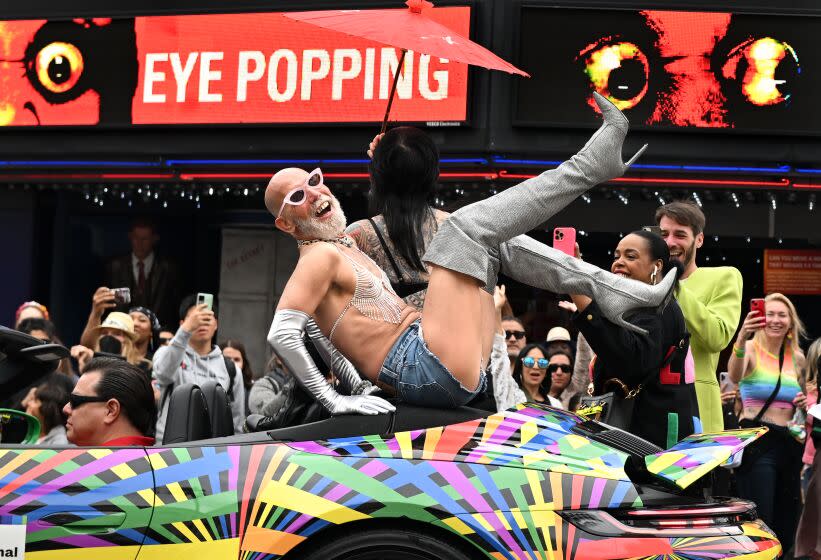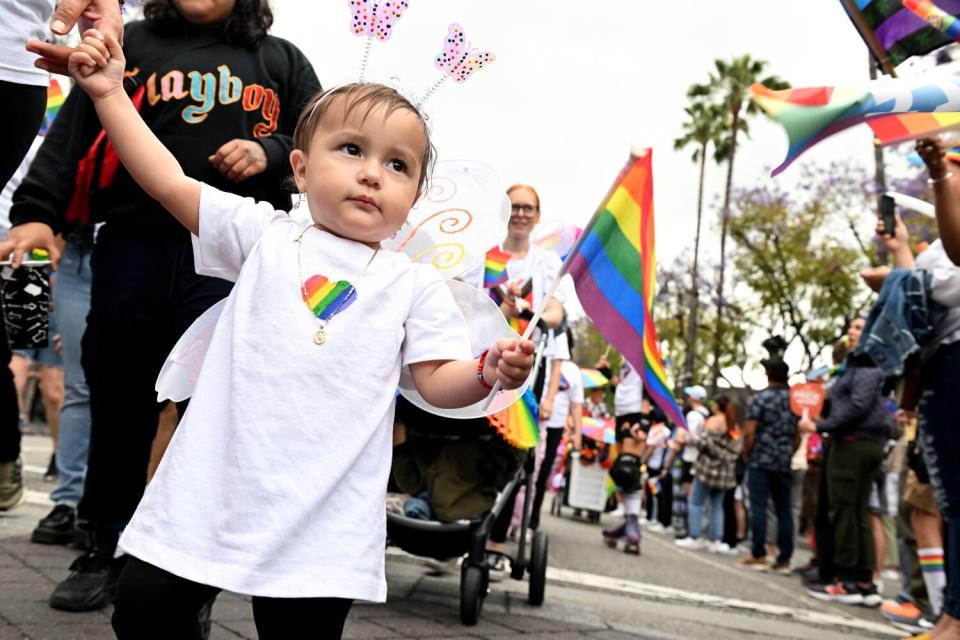'When people understand our humanity, we win.' L.A. Pride parade celebrates community

For the record:
9:08 a.m. June 12, 2023: An earlier version of this article said the ONE Archives Foundation is at USC. The foundation is a separate entity from the ONE Archives at USC.
Sebastian Soto wishes there could be an LGBTQ+ Pride parade every day — in every city and every country in the world.
Alas, that’s not the case. But for Soto, who is gay, there was plenty of joy and laughter to be had Sunday at the Los Angeles Pride parade, one of the nation’s oldest and biggest LGBTQ+ Pride celebrations.
“We wanted to celebrate pride and get together in this weird time we’re living in and bring some color and love and light and hope,” said Soto, a Hollywood resident who wore a hot pink duster and pearl necklace.
Soto and a group of friends, all gay or bisexual men who attended WeHo Pride in West Hollywood last weekend, met early Sunday and paid homage to “the queen” Britney Spears’ star on the Hollywood Walk of Fame, taking photos with it before finding a spot on the parade route next to Liberace’s star on Hollywood Boulevard.
“I’m happy to be here with my husband — happy, safe — because I know we couldn’t do this in so many places in the world and not every city in the U.S.,” said Soto’s friend Gabriel Lugo, 28, a screenwriter from North Hollywood.

With all the anti-LGBTQ+ laws being considered right now, it’s important to show up, Lugo said, and to simply make the point: "It’s OK to be queer.”
The L.A. Pride parade, which drew thousands of people to Hollywood Boulevard, came at a time when LGBTQ+ issues — especially the rights and visibility of transgender and gender nonconforming people — are center stage in the U.S. culture wars.
Across the country, conservative lawmakers are attempting to ban drag shows, stop parents from seeking gender-affirming care for their children, and restrict transgender athletes from participating in youth sports.
In Southern California recently, protests erupted in North Hollywood and Glendale over the teaching of gender and sexuality in schools. The L.A. Dodgers invited, booted, then re-invited the Sisters of Perpetual Indulgence, a group of satirical nuns in drag, to its Pride Night.
Tony Valenzuela, executive director of the ONE Archives Foundation, which focuses on LGBTQ+ history, said he was hardly surprised by the conservative backlash, which has happened many times before. Conservative lawmakers and power brokers, he said, put a lot of time, energy and money into the antiabortion movement, and after the fall of Roe vs. Wade last year, they needed “a new bogeyman” to “drum up fear” and get votes.
“It’s a moment where we are all on high alert,” Valenzuela said. “That this is happening during Pride — it’s a time to reflect and understand that the stakes continue to be high for so many of us, and this is a time to mobilize and make sure that our stories continue to be told. When people understand our humanity, we win.”
The L.A. Pride parade sashayed beneath gray June gloom skies. It was 69 degrees and breezy — a chilly morning for the shirtless dancers atop floats.
As one man in a short, brown velvet dress ran down the sidewalk along Hollywood Boulevard, screaming, “Happy Pride! Yeahhh!” purple jacaranda petals plopped to the ground.
Nery Alvarado and her husband, Victor, brought their 21-month-old daughter, Noelia, who wore a rainbow-colored skirt, pink tennis shoes and pigtails as she toddled near the parade route.
Noelia was born during the COVID-19 pandemic, and this was her first parade.
“I brought my family so she can learn that families look different and love looms different, but it’s always love,” Alvarado said. “I want to instill that in her from a very young age."
Alvarado, 34, of Koreatown, is the director of behavioral health services for Bienestar, a social services organization that focuses on Latino and LGBTQ+ people. She doesn’t like it when people say parents need to shield their children from LGBTQ+ people and Pride events, she said.
“The lessons we teach our children — they pass those down,” she said. “As parents, we want our daughter to embrace everyone.”
Nearby, Courtney Woodward, 30, of Denver bounced her 9-month-old niece on her hip. The baby — wearing rainbow-colored UGG sandals — is Woodward’s twin sister’s child and is named Riot because her parents met during the protests after George Floyd’s murder by police in 2020.
“Baby Riot is an activist,” said Woodward, who is bisexual and grew up with her twin in foster care in Hollywood. “I’m showing her that love is love and humans are human. Also, how f— cute is she?”
Drag queen Tiffany Cartier — wearing a gold lamé skirt, curly orange wig and bright pink rouge — said she’d been coming to Pride parades for more than two decades and had stopped coming for a few years.
She’s 63, and it felt like it was time to let the hipper, younger folks do their thing and enjoy the party. It felt like so many LGBTQ+ rights she fought for years ago had been won.
But she was back this year because of all the anti-drag, anti-LGBTQ vitriol. Once again, Pride felt like a protest.
“It’s so sad, to tell you the truth,” Cartier said. “We’ve already fought this fight. We shouldn’t have to re-fight it.”
As a street preacher shouted, “Turn away from your homosexuality! Turn away from your transgenderism!” into a microphone, passersby flipped him off and laughed.
A few drag nuns from the Sisters of Perpetual Indulgence waved from atop a bus promoting the Los Angeles LGBT Center as “I Will Survive” boomed. Someone screamed, “Yeah, Water and Power!” and the crowd cheered as a rainbow-bedecked Los Angeles Department of Water and Power truck rolled by.
"Is labor in the building? Teamsters!” a man shouted from the shiny blue float for the International Brotherhood of Teamsters.
It was only the second time for the Teamsters to participate in the L.A. Pride parade — last year they squeaked in, after registration was closed, and rolled a semi-truck down the route — and the first year with an actual float, said Christopher Fuentes, president of the union’s LGBTQ+ Caucus.
Fuentes, 63, a film location manager from Hollywood, teared up as he spoke about the float, which had the Teamsters logo — with the heads of horses named Thunder and Lightning — in rainbow colors.
Fuentes said the union’s national leadership has become much more supportive of its queer members. In recent days, the Teamsters has sent notices to its members formally recognizing the International Transgender Day of Visibility and June as LGBTQ Pride month.
Fuentes said he has gotten a lot of thankful, happy calls from members around the country since those messages went out. One, he said, was from from a UPS driver in rural Nevada who wanted an LGBTQ+ Caucus T-shirt to show his support for his transgender child.
Kathleen Brennan, 47, president of Teamsters Local 1932 in San Bernardino, said she publicly came out as a lesbian when she became a Teamster in 2015 because members told her they had her back.
Brennan, who works in IT for San Bernardino County, had been in the closet for years, except among close friends and family.
In recent weeks, her local has been going to school board meetings at which people protested LGBTQ+ issues and tried to ban queer-themed books. She said she has been heckled by far-right groups such as the Proud Boys and Gays Against Groomers.
For her, a presence at LGBTQ+ events was a message to queer youth that they deserved good wages and good protections — not just survival.
“I want kids to know that the only guarantee of having equality and justice truly, is a union contract,” she said, noting that only about half the states in the country have workplace discrimination laws protecting LGBTQ people. "I want these young queer kids to know: You have a home. You have a place that will accept you and cherish you and will protect you.”
This story originally appeared in Los Angeles Times.

